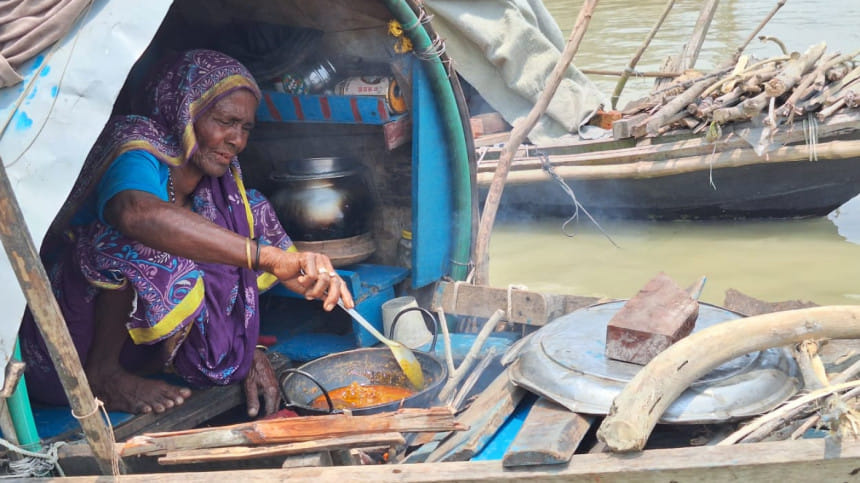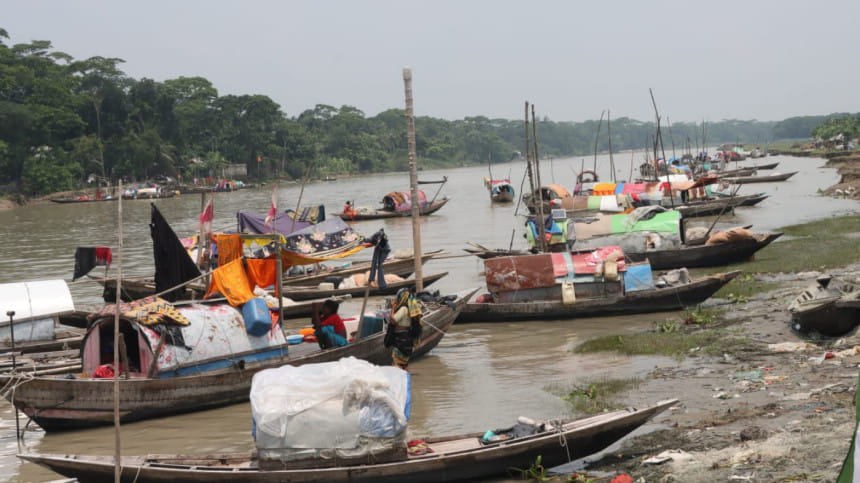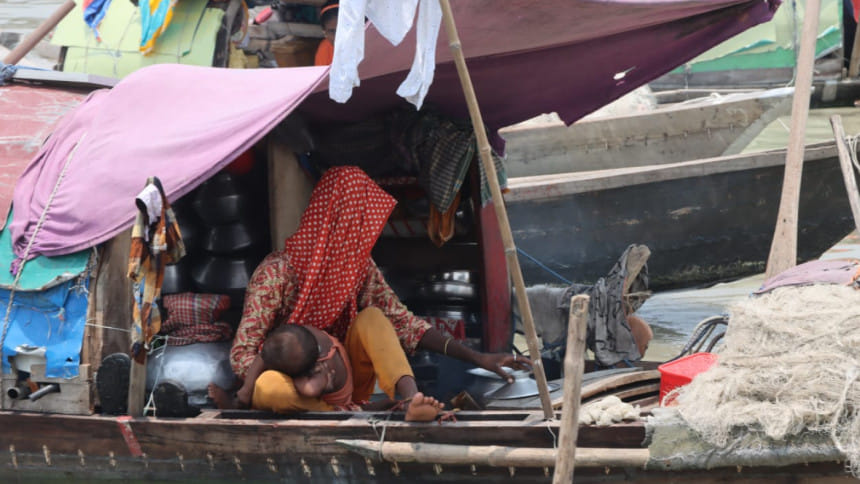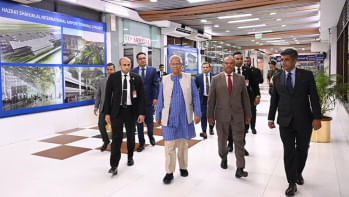Left adrift, Eid is just another day for the Manta

While tens of millions of people across Bangladesh celebrate Eid, it's just another day afloat for the nearly 300 members of the Manta community, a group of fishers living on traditional boats along the banks of the Arial Khan river in Barishal for more than 50 years.
Once 178 boats strong, the community now has 107 boats housing 107 men, 98 women, and around 60 children, according to their Sardar (community leader) Jasim Sardar. Their lives begin and end on water.
During a visit this afternoon at Laharhat launch terminal, the majority of the men were away fishing. The rest, mostly women and children, were enjoying a Bangla movie at a roadside shop as part of their Eid celebration.
Sworna Begum, her hands adorned with red henna and glass bangles, smiled quietly when asked about her age -- she just doesn't know it. In fact, she doesn't know the ages of any of her four children. Her son Maidul is married and lives in a separate boat. Her daughter-in-law, apparently 14 or 15 years old, applied the henna on Sworna's hands. This lack of basic information isn't unique to Sworna. No one in the fleet knows their actual age.

No one can read or write. Most cannot say what's written on their National ID cards. Many of the women can't count money, only recognise notes by colour and size.
While most of the younger men use mobile phones, women struggle. Some can receive calls, but dialing a number is still difficult.
"We don't have any fisherman cards or housing under any rehabilitation project," said Sworna. "No one here has ever received any government allowance. We take loans from local shops and pay them back when we catch fish. That's how we survive. No one thinks about us."
Jasim's wife Nilufa echoed the same hardship. "The little fish we catch now is not enough. I had to go fishing even on Eid morning. There's hardly any fish left in the river now. Eid felt like just another day."
Hakim Sardar said about half the boats have solar panels, most of which were bought on loans -- around Tk 7,000-8,000 each. "We live on loans from local NGOs. The shopkeepers usually act as our guarantors."

Children of the community have no access to formal schooling. As a result, they lack both literacy and language development. However, two months ago, a local NGO named AVAS established a multi-purpose community daycare centre. Here, children are taught basic literacy and numeracy.
Kohinur Begum, a housewife, said, "Our lives float on water. Even in death, we have no land to call our own. We have to plead for a burial ground."
"Eid is just another day for us," she added, "But we are grateful that we got to eat beef after a long time."
Khokon Sardar said that until the day before Eid, they didn't know how they would celebrate. But help came from Islamic Relief Bangladesh, which donated two cows. The 140kg of meat was distributed equally among all families. "It brought rare joy to the community," he said.
The Manta people survive by fishing in the river, but with fish stocks declining and no alternative skills or education, their livelihoods are becoming increasingly fragile.
Sabina Akhter, supervisor of the community centre run by AVAS, said the centre currently serves 34 children. The NGO estimates that 175 Manta people live in the launch terminal area, 34 in Chorbaria, 15 in Bukhainagar, 22 in Dapdapia, and a separate fleet in Babuganj upazila.
"Our goal is to provide basic education, at the least, to the children," she said.
ASM Akhtaruzzaman Talukder, deputy director of the Department of Social Services in Barishal, said although some initiatives had been taken for the Bede community, there is no dedicated project for the Manta.
"We have informed the higher authorities about the Manta, and we hope to launch a programme tailored for them soon," he added.

 For all latest news, follow The Daily Star's Google News channel.
For all latest news, follow The Daily Star's Google News channel. 



Comments